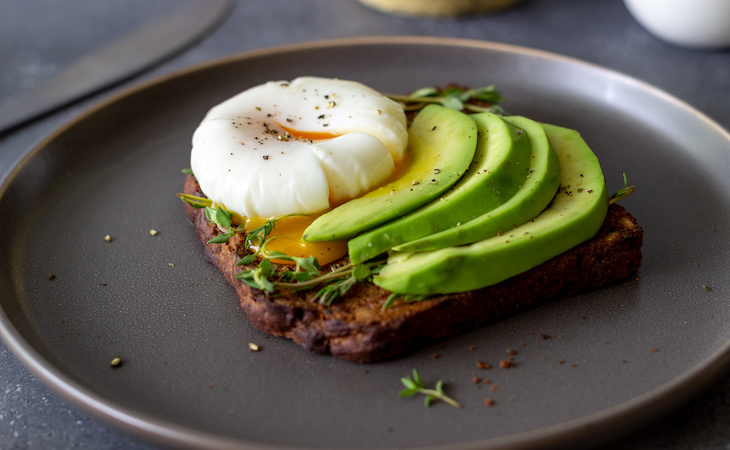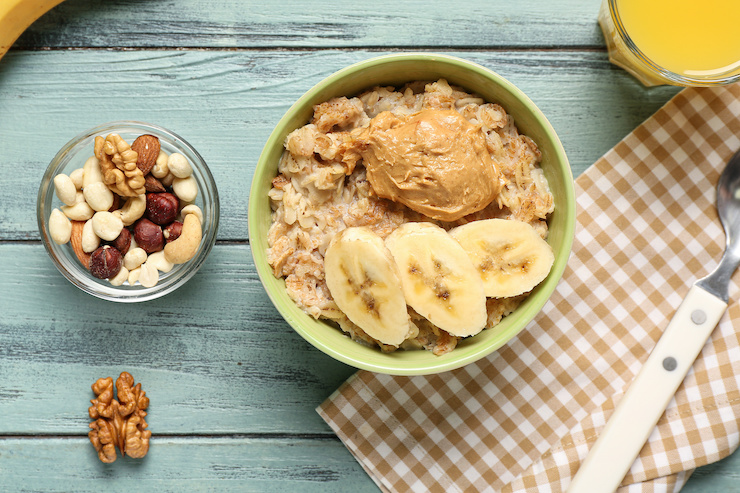
June 17, 2025
Why Eating Breakfast Could Be the Key to a Good Night’s Sleep
Written by Johna Burdeos, RD

Eating breakfast supports better sleep by aligning with the body’s circadian rhythm, preventing late-night eating, and promoting quality rest. A balanced morning meal provides vital nutrients like fiber, magnesium, and tryptophan, boosting mood, energy, and melatonin production. Skipping breakfast may lead to poor sleep, increased stress, and disrupted eating patterns.
When it comes to getting a good night’s sleep, most of us think about avoiding caffeine or turning off our screens before bed. But what you eat and when you eat it can also affect how well you sleep at night.
While much attention is given to bedtime snacks and evening meals, there’s growing evidence that what happens at the start of your day matters too. Ahead, we’ll explore how eating breakfast in the morning may help set the stage for a more restful, restorative night.
Nutritional benefits of eating breakfast
Breakfast comes after the longest break from eating—overnight. It’s a key time to nourish your body and help prevent nutrient deficiencies. People who eat breakfast tend to get more fiber, vitamins, and minerals like calcium, iron, folate, and vitamins A and C. [1]
These nutrients support digestion, energy, and overall health. For example, fiber helps keep you regular and feeling full, while iron carries oxygen in your blood, and vitamin C protects your cells. [2, 3, 4] Starting your day with a balanced breakfast helps fuel your body right from the start.
Eating breakfast is linked to several health benefits. Some studies show it may lower the risk of gaining weight, type 2 diabetes, and heart disease. Breakfast is also often tied to better focus and mental alertness.
Much research on how breakfast may improve cognitive performance has focused on children and adolescents. Breakfast is tied to improved memory and mood and reduced absenteeism in students. [5] Breakfast can also impact your sleep, as you’ll read ahead.
Eating breakfast is linked to several health benefits, including lowered risk of diabetes, better cognitive performance in young people, and improved sleep.
How eating breakfast impacts your sleep
Your eating habits and your sleep are closely connected. Research shows that when you eat matters, not just what you eat. Your body follows a natural clock called a circadian rhythm, which helps control sleep, hunger, and digestion. [6]
Eating during the day and resting at night fits this natural rhythm. Skipping breakfast can throw off your body’s schedule.
Studies show that people who skip breakfast often go to bed later, sleep for fewer hours, and report worse sleep quality. Eating breakfast may help keep your body in sync and support better sleep at night. [6]
Additionally, skipping breakfast can impact your meals later. Studies show that people who skip breakfast often eat more at lunch and dinner and may eat later in the day.
Research also suggests that late eating is linked to poor sleep quality. [6] Eating regular meals three times a day leads to better sleep quality. [7]

The best breakfast ideas for better sleep
Here are a few healthy breakfast ideas that provide fiber, healthy fat, and protein to promote fullness, boost energy, and support metabolism, along with essential vitamins and minerals.
Magnesium, found in beans, leafy greens, nuts, and seeds, supports muscle and nerve function, helps regulate calming brain chemicals like GABA, and plays a role in melatonin production and stress control. [8]
Some of these foods, like cheese, milk, and peanuts, also contain tryptophan, which helps make melatonin and serotonin to support restful sleep. [9]
- Cottage cheese with chopped nuts and berries
- Eggs and avocado slices on whole-grain toast
- Greek yogurt with flax seeds and chopped cherries
- High-protein pancakes with peanut butter and a side of fruit
- Oatmeal with nut butter and banana slices
- Scrambled tofu with leafy greens and tomatoes on whole-grain toast
- Smoothie made with milk, spinach, fruit, and chia seeds
- Veggie breakfast burrito made with whole-grain tortillas, black beans, and fajita veggies
FAQs
Why is it important to eat breakfast?
Eating breakfast gives your body energy after a night without food. It can help you stay focused, feel full longer, and make healthier food choices throughout the day. A balanced breakfast also provides important nutrients your body needs to stay healthy.
What happens if we skip breakfast?
Skipping breakfast can lead to low energy, overeating later in the day, and missing out on important nutrients. It may also affect focus, mood, and even sleep quality.
What’s the healthiest breakfast to eat?
The healthiest breakfast includes a mix of protein, fiber, and healthy fats, such as eggs with whole-grain toast and fruit or yogurt with nuts and berries. This combination helps keep you full and energized and supports overall health.
Which diet is best for sleep? Learn how the Mediterranean diet can affect your sleep.
References
- Gibney, M. J., Barr, S. I., Bellisle, F., Drewnowski, A., Fagt, S., Livingstone, B., Masset, G., Varela Moreiras, G., Moreno, L. A., Smith, J., Vieux, F., Thielecke, F., & Hopkins, S. (2018). Breakfast in Human Nutrition: The International Breakfast Research Initiative. Nutrients, 10(5), 559. https://doi.org/10.3390/nu10050559
- MedlinePlus. Fiber. https://medlineplus.gov/ency/article/002470.htm
- MedlinePlus. Iron in diet. https://medlineplus.gov/ency/article/002422.htm
- MedlinePlus. Vitamin C. https://medlineplus.gov/ency/article/002404.htm
- Centers for Disease Control and Prevention: School Nutrition. Childhood Nutrition Facts. https://www.cdc.gov/school-nutrition/facts/index.html
- Saidi, O., Rochette, E., Dambel, L., St-Onge, M. P., & Duché, P. (2024). Chrono-nutrition and sleep: lessons from the temporal feature of eating patterns in human studies – A systematic scoping review. Sleep medicine reviews, 76, 101953. https://doi.org/10.1016/j.smrv.2024.101953
- Pattnaik, H., Mir, M., Boike, S., Kashyap, R., Khan, S. A., & Surani, S. (2022). Nutritional Elements in Sleep. Cureus, 14(12), e32803. https://doi.org/10.7759/cureus.32803
- Esquivel, M. K., & Ghosn, B. (2024). Current Evidence on Common Dietary Supplements for Sleep Quality. American journal of lifestyle medicine, 18(3), 323–327. https://doi.org/10.1177/15598276241227915
- MedlinePlus. Tryptophan. https://medlineplus.gov/ency/article/002332.htm
Johna Burdeos, RD
Registered dietitian
Johna Burdeos is a seasoned registered dietitian with 20 years of expertise spanning acute care, long-term care, and outpatient nutrition counseling. Known for her clear, research-backed approach, Johna now channels her deep knowledge into impactful health and nutrition writing for major outlets like Health.com and U.S. News and World Report. As a busy mom committed to nourishing her family, she’s passionate about sharing practical, fuss-free meal-planning tips to help others stay nourished, no matter their schedule.


